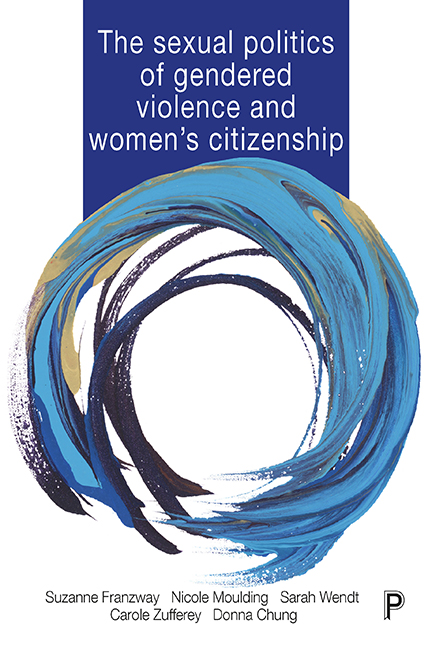Book contents
- Frontmatter
- Contents
- List of tables and figures
- Notes on authors
- Acknowledgements
- one The sexual politics of gendered violence and women’s citizenship
- two Problems of citizenship, violence and gender
- three Challenges of researching gendered violence
- four Living the connected effects of violence
- five Gendered violence and the self
- six Re-engaging lives
- seven Campaigns for women’s freedom from violence
- eight Transforming sexual politics
- References
- Index
seven - Campaigns for women’s freedom from violence
Published online by Cambridge University Press: 13 April 2022
- Frontmatter
- Contents
- List of tables and figures
- Notes on authors
- Acknowledgements
- one The sexual politics of gendered violence and women’s citizenship
- two Problems of citizenship, violence and gender
- three Challenges of researching gendered violence
- four Living the connected effects of violence
- five Gendered violence and the self
- six Re-engaging lives
- seven Campaigns for women’s freedom from violence
- eight Transforming sexual politics
- References
- Index
Summary
Introduction
The women who participated in this research project have provided compelling evidence of the long-term negative effects that gendered violence is likely to have on individual women and their children across interconnected aspects of everyday life. Both the quantitative data and the women's accounts uncover the damage caused by such violence to their mental health and identity, employment and income, and their housing and social engagement. However, their experiences are not uncommon for women whenever and wherever they have lived. As both Max Weber in the 20th century and Sylvia Walby in the 21st have argued, violence is woven into the fabric of (almost all) societies. The form of violence on which we are focused here, namely intimate partner violence (IPV) against women, lies at the extreme end of the spectrum of gendered power that is always being contested. We encapsulate this struggle in the term ‘sexual politics’. Women's rights to exercise all the capabilities necessary to live decent flourishing lives have not been easily won, and clearly need to be constantly defended against the gender inequalities produced by male-dominated sexual politics. Our argument that violence against women erodes, even prevents, their achievement of full citizenship is rooted in the work of feminist activists and the reflexivity of women's experiences of unequal power and force in many communities and over many decades.
Violence against women continues; however, there have been shifts in moral and political attitudes towards gendered violence. Naming violence against women as a problem has not been a straightforward matter, even for the alert and aware feminists of the early years of the women's liberation movement, the so-called second wave of feminism. The shift in attitudes and contemporary condemnation of violence against women has taken considerable and persistent effort, mainly on the part of feminist activists. As we have shown, campaigning continues to be necessary if we are to reach gender equality and stop gendered violence. Such campaigning is taking different forms in the contemporary environment through global access to digital technologies which are changing both the knowledge available to the community and campaigning strategies.
- Type
- Chapter
- Information
- The Sexual Politics of Gendered Violence and Women's Citizenship , pp. 147 - 170Publisher: Bristol University PressPrint publication year: 2018



